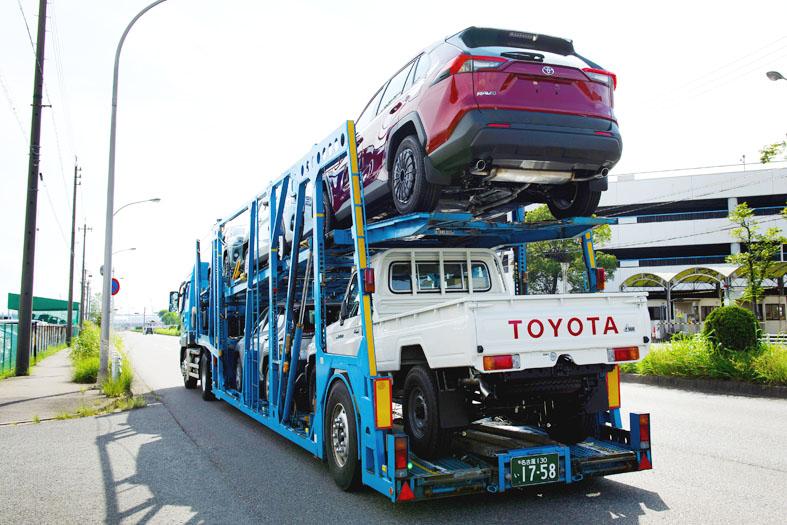Japan’s Rohm Co said that vital semiconductors for automobiles and industrial machinery are likely to remain in short supply at least throughout next year, adding to ominous warnings about further fallout from the global chip crisis.
The Kyoto-based chipmaker, whose clients include Toyota Motor Corp, Ford Motor Co and Honda Motor Co, has been hampered by a severe shortage of key materials, as well as full production lines, Rohm CEO Isao Matsumoto said.
The company started beefing up its capacity in September last year and plans to spend another ¥70 billion (US$636 million) this fiscal year, but the full contribution from such investments would not be seen immediately because production machinery is taking longer to arrive, he added.

Photo: Bloomberg
“All of our production facilities have been running at their full capacity since September last year, but orders from customers are overwhelming,” Matsumoto said in an interview this week. “I don’t think we can fulfill all the backlog of orders next year.”
It joins peers like Infineon Technologies AG in warning that supply chain struggles are likely to persist for far longer than previously anticipated. Chip delivery times have already surpassed 20 weeks, as the Delta variant of SARS-CoV-2 complicates efforts to resume normal operations from Japan to Southeast Asia.
Material and component shortages, compounded by jammed trains, ships and planes, have forced global automakers from Toyota to Volkswagen AG to cut or suspend production in recent weeks. The Japanese auto giant last week said that it would temporarily halt production at 14 plants.
Founded more than 60 years ago, Rohm has become an integral part of the automotive supply chain, as automakers add more electronics and semiconductors to vehicles. The Japanese manufacturer’s automotive solutions include devices used for power management, air-conditioning, lighting and entertainment.
The most severe bottleneck is a lack of materials like those required to make leadframes — the metal structure inside a semiconductor unit that communicate signals with the outside of the package.
“Offers to hike prices won’t do a job at all anymore, because our suppliers just don’t have a unit of stock at hand,” Matsumoto said
The shortages might benefit the bottom line.
“Rohm’s operating profit margin may widen as its planned capacity expansion could bode well for sales and profit growth, as well as overseas market share gains, amid looming global chip shortages,” Bloomberg Intelligence’s Masahiro Wakasugi and Ian Ma wrote in a research note this month.
Still, some analysts said that a sudden drop in demand might eventually follow, as beefed up production lines start contributing to capacity and customers finish securing enough inventories.
“The current crunch is stemming from suppliers’ lack of output and makers trying to buy more components than what they need due to concerns,” Morningstar’s head of equity research Kazunori Ito said. “Both should go away in 2023 or so.”

Real estate agent and property developer JSL Construction & Development Co (愛山林) led the average compensation rankings among companies listed on the Taiwan Stock Exchange (TWSE) last year, while contract chipmaker Taiwan Semiconductor Manufacturing Co (TSMC, 台積電) finished 14th. JSL Construction paid its employees total average compensation of NT$4.78 million (US$159,701), down 13.5 percent from a year earlier, but still ahead of the most profitable listed tech giants, including TSMC, TWSE data showed. Last year, the average compensation (which includes salary, overtime, bonuses and allowances) paid by TSMC rose 21.6 percent to reach about NT$3.33 million, lifting its ranking by 10 notches

Popular vape brands such as Geek Bar might get more expensive in the US — if you can find them at all. Shipments of vapes from China to the US ground to a near halt last month from a year ago, official data showed, hit by US President Donald Trump’s tariffs and a crackdown on unauthorized e-cigarettes in the world’s biggest market for smoking alternatives. That includes Geek Bar, a brand of flavored vapes that is not authorized to sell in the US, but which had been widely available due to porous import controls. One retailer, who asked not to be named, because

SEASONAL WEAKNESS: The combined revenue of the top 10 foundries fell 5.4%, but rush orders and China’s subsidies partially offset slowing demand Taiwan Semiconductor Manufacturing Co (TSMC, 台積電) further solidified its dominance in the global wafer foundry business in the first quarter of this year, remaining far ahead of its closest rival, Samsung Electronics Co, TrendForce Corp (集邦科技) said yesterday. TSMC posted US$25.52 billion in sales in the January-to-March period, down 5 percent from the previous quarter, but its market share rose from 67.1 percent the previous quarter to 67.6 percent, TrendForce said in a report. While smartphone-related wafer shipments declined in the first quarter due to seasonal factors, solid demand for artificial intelligence (AI) and high-performance computing (HPC) devices and urgent TV-related orders

MINERAL DIPLOMACY: The Chinese commerce ministry said it approved applications for the export of rare earths in a move that could help ease US-China trade tensions Chinese Vice Premier He Lifeng (何立峰) is today to meet a US delegation for talks in the UK, Beijing announced on Saturday amid a fragile truce in the trade dispute between the two powers. He is to visit the UK from yesterday to Friday at the invitation of the British government, the Chinese Ministry of Foreign Affairs said in a statement. He and US representatives are to cochair the first meeting of the US-China economic and trade consultation mechanism, it said. US President Donald Trump on Friday announced that a new round of trade talks with China would start in London beginning today,